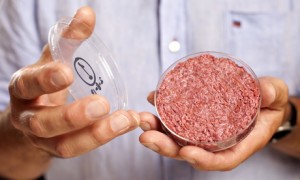Would you eat lab grown meat to save the environment?
 Burger made from Cultured Beef, which has been developed by Professor Mark Post of Maastricht University in the Netherlands. Photograph: David Parry/PA Wire
Burger made from Cultured Beef, which has been developed by Professor Mark Post of Maastricht University in the Netherlands. Photograph: David Parry/PA Wire
A recent study from Cambridge and Aberdeen Universities published in Nature Climate Change, calls on people to limit their weekly intake of meat to two portions and poultry to seven. It claims that reducing the demand for meat-heavy western diets is an often overlooked solution to decreasing food waste, delivering emissions reductions and improving global food security.
It’s not the first time we’ve been encouraged to eat less pork and more plants to help curb climate change. Back in 2008, Dr Rajendra Pachauri, chair of the UN intergovernmental panel on climate change, urged people to have one meat-free day a week.
Beef in comparison to potatoes, wheat and rice on a per calories basis, requires 160 times more land and produces 11 times more greenhouse gases. Still, we crave it. According to the latest data from the Food and Agriculture Organisation (FAO), every year each Briton eats about 85kg of meat, roughly amounting to 33 chickens, one pig, three-quarters of a sheep, and a fifth of a cow.
In 2002, the Danes were consuming 145.9kg of meat per person, ahead of the US at 124.8kg. The FAO estimates that by 2050, driven by an increasing demand from the growing middles classes in countries like China and India, the world will be eating twice as much meat (pdf) as it is today.
Is there a way of satisfying the growing appetite for meat, while also protecting the environment?
Last year, Dr Mark Post, of the University of Maastricht in the Netherlands presented the first hi-tech hamburger to the public. Made from tens of thousands of strands of protein grown in petri dishes from cattle stem cells, the project was backed by Google’s co-founder, Sergey Brin with £215,000 ($330,000).
Is this in-vitro meat (also known as cultured meat or lab-grown meat) the answer to sustainably meeting global food demand? Compared to conventionally farmed beef, lab beef requires less food input, energy, land and water and would greatly reduce greenhouse gas emissions. An independent study puts the difference at 45% less energy, 99% less land and 96% fewer greenhouse gas emissions.
However, will lab-burgers just perpetuate our meat addiction, rather than encourage a serious evaluation of the food system and its sustainability? While lab technicians might argue in-vitro meat offers us more control over our diets (i.e we can alter fat content), fans of the slow-food movement might counter that in-vitro further widens the gap between food production and consumer, giving us less control.
Is the investment of time and money better spent on the smallholder farming sector in developing countries where a growth in agriculture would help improve food security and reduce poverty? If hi-tech hamburgers eventually become cheap to produce and popular will they be pushed into developing countries at the detriment of farmers?
If we think it possible to get over the Frankenstein fear factor of eating veal made in a vial, shouldn’t we instead get over our aversion to edible insects and tuck into grasshopper, caterpillar and cricket burgers as the FAO recommends (pdf)?
What do you think?
Vote in the poll below to let us know where you fall on the in-vitro meat debate and share your thoughts on the place of lab-meat in sustainable food production in the comments section below.


Recent Comments